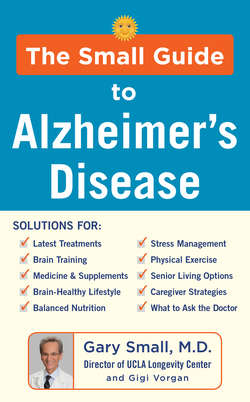Читать книгу The Small Guide to Alzheimer's Disease - Gary Small - Страница 11
На сайте Литреса книга снята с продажи.
Depression and Anxiety Worsen Memory
ОглавлениеA 78-year-old retired schoolteacher was brought to the emergency room because of a depressed mood, memory loss, confusion, insomnia, weakness, and agitation. As is typical in emergency room settings, the doctors drew her blood to perform some laboratory tests to search for medical causes of an altered mental state. They also got a brain scan of her head to make sure there wasn’t a tumor or brain hemorrhage that could be causing her mental symptoms.
The laboratory tests came back normal, and the brain scan didn’t pinpoint any tumors, strokes, or blood clots. The medical team still had several unanswered questions: What is this patient suffering from? Is it Alzheimer’s disease? Is it depression? Could it be a combination of the two, or possibly something else entirely? The patient was admitted to the hospital, and over the next week it became clear that she had mild Alzheimer’s dementia that was worsened by a depression.
Mood and cognitive symptoms frequently overlap in older adults. Patients with mild cognitive impairment or dementia often experience feelings of anxiety and sadness. Particularly early on in the course of cognitive decline, when patients are aware of their cognitive deficits, they typically experience an emotional reaction to those losses.
Patients with mild memory complaints often tell me how worried they are about their symptoms. Research shows that if patients worry about their symptoms, their memory performance scores will be worse compared to those who do not. Anxiety and other mood changes are distracting and make it difficult to focus attention, which is essential for learning new information and retrieving it later—the basic mental skills needed for effective memory function.
Changes in the brain associated with chronic dementias like Alzheimer’s disease can cause imbalances in the brain messengers (i.e., neurotransmitters) that control mood. Once those neurotransmitters decline, the likelihood of mood symptoms increases. Our UCLA group performed PET scans on older patients with major depression, which is a form of depression that is severe enough to require medical intervention. These patients generally experience a persistently depressed mood and loss of pleasure or interest in life as well as disturbed sleep, feelings of guilt, and suicidal thoughts.
In our study, we found that the amyloid plaques and tau tangles that are typical of Alzheimer’s disease were also present in the brains of these older patients with major depression. This raises the possibility that symptoms of depression may be a manifestation of Alzheimer’s disease in some older patients, especially early in the course of brain neurodegeneration. Other studies have supported the idea that depression can be a risk factor for developing dementia. These issues are critically important because an accurate diagnosis of the underlying condition or conditions is essential for determining the most effective treatment strategy for the symptoms.
Investigators at St. Louis University studied the frequency of mood changes and other behavioral symptoms that occur prior to the diagnosis of dementia as well as after a dementia diagnosis is confirmed. They found that symptoms of depression occurred in approximately half of the patients over 20 months prior to their diagnosis of dementia. Symptoms of anxiety occurred in more than one out of five patients 8 months prior to their diagnosis of dementia. Both depression and anxiety symptoms may continue to develop after the diagnosis of dementia. As the disease progresses, other behavioral disturbances are more likely to emerge, such as agitation, irritability, hallucinations, and aggression.
Often these different syndromes of combined mood and cognitive impairment can be sorted out based on the most prominent symptom, whether it is depression, anxiety, memory loss, or something else. For depression, mood changes are usually present, but physical symptoms are common as well, such as appetite loss, insomnia, and fatigue. However, it can become confusing when patients present with what appears to be a dementia but their condition is actually due to an underlying major depression. The syndrome has been termed pseudo-dementia, and patients will complain about memory issues and confusion as well as other symptoms typical of depression, such as sleep disturbances, fatigue, and appetite loss. Interestingly, the patient may not actually feel sad.
Diagnosing Major Depression
To help doctors identify the cluster of symptoms that indicate severe cases of depression that go beyond normal mood fluctuations, they sometimes use a diagnostic mnemonic: SIG E CAPS. “SIG” is what doctors write on prescription pad directions and is short for the Latin signetur, or “let it be labeled.” E stands for “energy,” and CAPS is short for “capsules.” So the mnemonic tells us “when to prescribe the energy capsules.” Each of the letters stands for one of eight diagnostic features of major depression:
Sleep decline or increase
Interest loss
Guilt feelings
Energy depletion
Concentration difficulties
Appetite change
Psychomotor disturbance (e.g., pacing, fidgety, or slowed down)
Suicidal thoughts
When people with depression have any four of the SIG E CAPS symptoms together, they should see a doctor to determine if they have a major depression that will respond to treatment.
